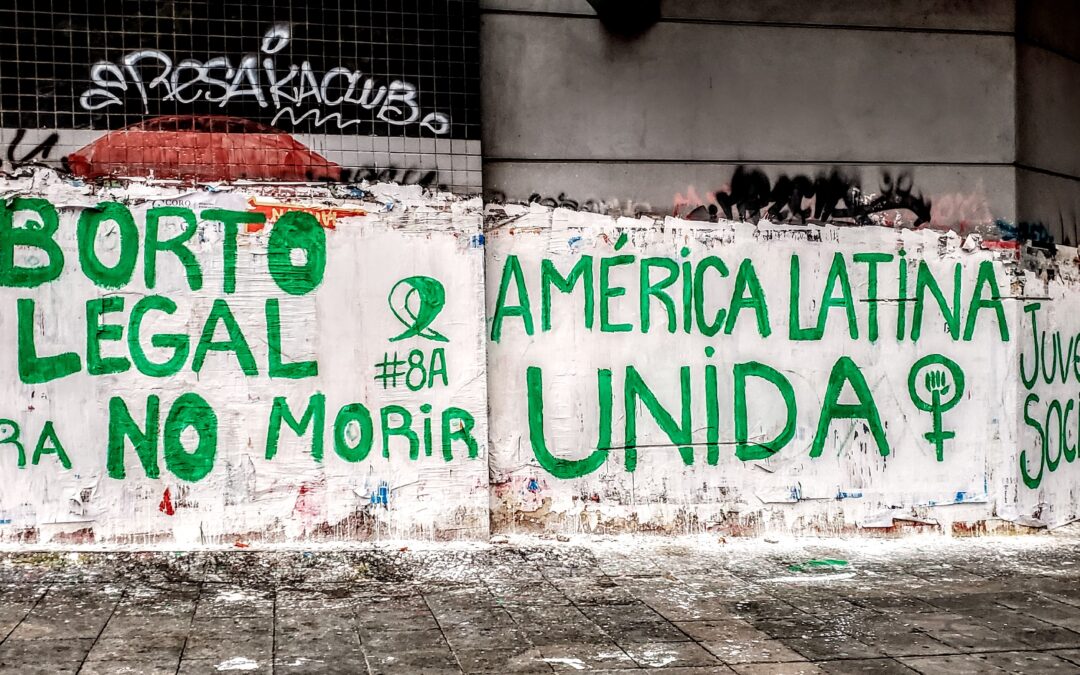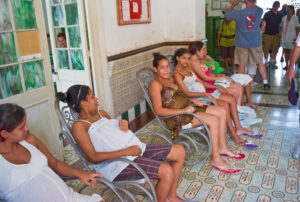Aborto legal by Eduardo Velázquez, available from https://www.flickr.com/
By Rebecca Ogden (University of Kent) and Rachell Sánchez Rivera (University of Cambridge)
Latin America has become something of a battleground over reproductive rights in recent years. As certain countries have passed landmark legalisations of abortion, many other governments have instead implemented backtracks over reproductive freedoms, including rights to a safe, free and legal abortion. Activist groups are facing persistent challenges in the battle to secure reproductive rights, lobbying for access to contraceptive healthcare and the recognition of gendered and racialised forms of reproductive violence, such as obstetric violence.
These contemporary struggles emerge from long histories of contentious reproductive health programmes, laws and policies in Latin American countries. Across the region, reproduction is arbitrated by religious, political and civic actors and institutions, and according to various, shifting agendas. Uneven access to reproductive healthcare—particularly as a result of neoliberal reforms, or in the wake of environmental disasters and armed conflict—has serious implications for gender equality and reproductive health.
Cuerpa Política is a podcast funded by the Institute of Latin American Studies (ILAS; now the Centre for Latin American and Caribbean Studies, CLACS) that addresses these issues through accessible conversations with a diverse range of activists, scholars and cultural producers, whose work engages with and contributes to struggles for reproductive justice in Latin America. The podcast has extended conversations which started at a conference and event series funded by ILAS and SLAS. The wider project seeks to bring together different approaches from the humanities—and Latin American cultural studies in particular—to the study of reproduction in Latin America. We want to explore the role played by the media and the arts in reflecting and shaping reproductive politics, and furthering quests for reproductive justice. We also hope to explore how academic approaches might positively collaborate with reproductive rights activism (and vice versa) or contribute to the improvement of reproductive health burdens in the region.
Historians bring an important perspective to this podcast series, illuminating how contested claims to control over reproduction through history have stood for broader power struggles, such as those over gender, race, morality, and the nation. The management of reproduction and nation-building processes have often been intertwined: our episode with Professor Alexandra Stern (coming in July 2021) explores how various institutions, practices, and laws legitimised pseudo-scientific eugenic ideas as a tool to ‘better’ the Mexican ‘race’ following the end of the Mexican Revolution in the 1920s. In our conversation with Professor Laura Briggs, we discuss how ideas of nation-building and colonialism in 20th-century Puerto Rico set the conditions for population control measures, sterilization procedures, and the first clinical trials of contraceptives, and, in parallel, how the colonial relationship between the US and the archipelago came to be defined through racialised and gendered debates about sex.
As Professor Briggs argues in her excellent recent book, there is no “outside” to reproductive politics. Just as reproduction runs as a constant undercurrent to political debates about welfare and immigration, for example, the lived realities of reproduction (the choices people make about their bodily autonomy, whether to have children, when, and how to parent them) are mediated and shaped by political and legal frameworks. Specific policies and healthcare practices relating to reproduction work to inhibit the reproductive freedoms of certain groups over others, stratifying reproduction along the lines of gender, race, class, disability, citizenship, and religion.
For example, Dr Cordelia Freeman discusses how access to abortion, which remains illegal in most Latin American countries, is bound by legal and geographical constraints. It is useful, she explains, to think about reproduction through concepts like mobility—the mobility of people crossing borders to seek abortions, and the transformative mobility of information and technology through pro-choice activists’ efforts. Often, as we hear from Dr Elise Andaya, it is overarching geopolitical and economic dynamics that determine reproductive freedoms, as many Cubans living under the US embargo have found—whether that is because of limited access to pharmaceutical-produced contraceptive methods, or the constraining effect of financial pressures on family planning.
The second episode (a recording of a roundtable from our conference) features activists discussing these legal, social and political dynamics and the specific challenges to reproductive justice in the contexts where they work (with a special focus on both Puerto Rico and Mexico). We have also spoken with leading activist voices Alexandra Marie Figueroa (Taller Salud) and Rebeca Ramos (Grupo de Información en Reproducción Elegida-GIRE) about the intersectional dynamics of reproductive justice in relation to gender violence, coloniality, gender and sexuality, ableism, and community building.
The conversations are a valuable prompt to consider how we broach questions through our research and activism. A recurring theme in these conversations is the need to decolonise research on reproduction—through the theory we consult, the way we read data, and the methods we engage. Decolonising medical history, for example, is an obvious imperative: a recent episode with Professor Gabriela Soto Laveaga places Mexico at the centre of one of the most important scientific breakthroughs, that is, the development of the contraceptive pill through the use of the Mexican yam, the barbasco. Gabriela Soto-Laveaga recounts that this breakthrough was possible only through the knowledge and labour of locals who picked the barbasco for the global production of synthetic steroid hormones in the middle of the twentieth century—locals who were usually indigenous, poor, and uneducated. An episode which will be released in July featuring Dr Céire Broderick emphasises the need to approach our research (hers looks at transnational connections of reproductive rights movements between Ireland, Chile and Argentina) through a decolonial theoretical framework. Long histories of colonial violence against indigenous bodies are exemplified in various forms in Peru from Fujimori’s forced sterilization campaigns to contaminant exposure in mining areas. So how we apply our interpretations to narratives of those events, as Dr Julieta Chaparro Buitrago describes, ought to be sensitive to this coloniality so as not to replicate it. Considerations of methodological approaches to reproduction are therefore crucial. In a forthcoming episode, Dr Karen Tucker approaches the social, linguistic and digital inequalities our methodologies should aim to navigate and overcome, drawing on her collaborative and award-winning Quipu Project, which incorporated a dynamic webpage featuring the testimonies of those who had experienced coerced sterilizations.
Cuerpa Política also seeks to interrogate the meanings and values that are attached to reproduction through different images and discourses, via the media and the arts. In the coming months we will share our conversation with Brazilian visual artist Clarissa Borges and the articulation of obstetric pain/pleasure, and themes of social reproduction in her work. Our discussion with Dr Anne Carruthers about her soon-to-be-published book presents analytical frameworks for understanding the female reproductive body in Latin American and North American cinema. We are also excited to share an episode featuring Dr Tatiana Sanchez Parra, in which our focus turns to different discursive framings of forced motherhood and reproductive violence occurring in the context of ongoing conflict in Colombia.
The podcast is free to download from Spotify, Apple or wherever you normally listen to podcasts, and we post about new episodes on our Twitter and Facebook. Please get in touch with Dr Rebecca Ogden (r.h.ogden[at]kent.ac.uk and Dr Rachell Sánchez Rivera (rs871[at]cam.ac.uk) if you are a researcher, activist, practitioner or artist and you’d like to participate in the series.
Authors
Rebecca Odgen (@ogden_rebecca) is Lecturer in Latin American Studies at the University of Kent
Rachell Sánchez Rivera (@RSanchezRivera1) is Research Fellow in Sociology at Gonville and Caius college, University of Cambridge



Recent Comments